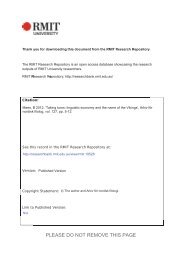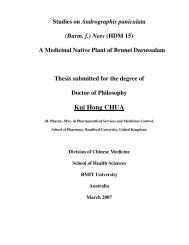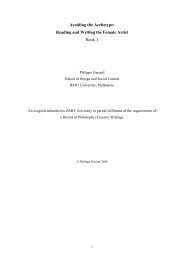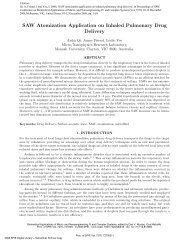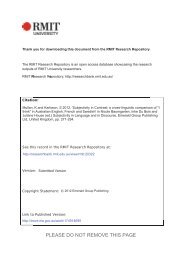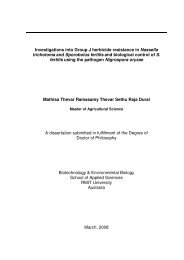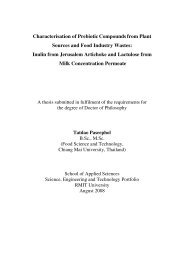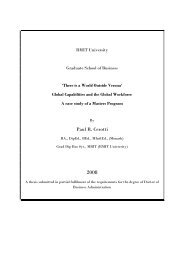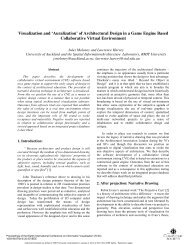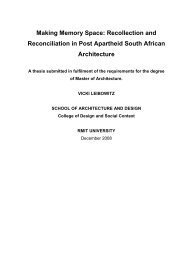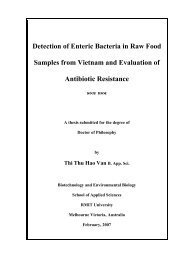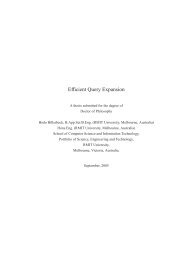Objects in Flux - RMIT Research Repository - RMIT University
Objects in Flux - RMIT Research Repository - RMIT University
Objects in Flux - RMIT Research Repository - RMIT University
You also want an ePaper? Increase the reach of your titles
YUMPU automatically turns print PDFs into web optimized ePapers that Google loves.
4.2 Hack<strong>in</strong>g<br />
Use of the terms ‘hack’ and<br />
‘hack<strong>in</strong>g’ emerged <strong>in</strong> the<br />
1960s and 70s with<strong>in</strong> the<br />
computer labs of MIT (Massachusetts<br />
Institute of Technology),<br />
Caltech (California<br />
Institute of Technology)<br />
and similar USA universities<br />
(Levy, 1984; Stallman,<br />
2002). From the outset the<br />
term was used to describe<br />
a diverse array of practices<br />
rang<strong>in</strong>g from the production<br />
of quick and crude software<br />
patches, to devis<strong>in</strong>g and<br />
execut<strong>in</strong>g elaborate practical jokes. Richard Stallman, ex-MIT student<br />
and founder of the Free Software Foundation, describes hack<strong>in</strong>g as<br />
an exploration of ‘the limits of what is possible, <strong>in</strong> a spirit of playful<br />
cleverness’ (2002), while Eric Steven Raymond, editor of The Jargon<br />
File (2004) and The New Hacker’s Dictionary (1996), def<strong>in</strong>es ‘hackers’<br />
as people with ‘technical adeptness and a delight <strong>in</strong> solv<strong>in</strong>g problems<br />
and overcom<strong>in</strong>g limits’, cit<strong>in</strong>g firstly, ‘expert programmers and<br />
network wizards’ that ‘built the Internet’, and secondly, ‘people who<br />
apply the hacker attitude to other th<strong>in</strong>gs, like electronics or music…<br />
[and] at the highest levels of any science or art’ (2001).<br />
Prom<strong>in</strong>ent members of the hacker community, <strong>in</strong>clud<strong>in</strong>g Raymond<br />
and Stallman, criticise the popular media for us<strong>in</strong>g the term ‘hacker’<br />
to describe ‘people (ma<strong>in</strong>ly adolescent males) who get a kick out of<br />
break<strong>in</strong>g <strong>in</strong>to computers and phreak<strong>in</strong>g the phone system’, preferr<strong>in</strong>g<br />
<strong>in</strong>stead the term ‘cracker’ to describe such people (Raymond, 2001).<br />
The basic difference, accord<strong>in</strong>g to Raymond, is that ‘hackers build<br />
th<strong>in</strong>gs, crackers break them’. Despite their objections, however, many<br />
examples of hack<strong>in</strong>g given by Raymond and Stallman <strong>in</strong>volve the<br />
circumvention or alteration of conventional behaviour through acts<br />
that are often deliberately disruptive and anti-authoritarian. As Levy<br />
documents <strong>in</strong> Hackers: Heroes of the Computer Revolution (2001),<br />
Hack<strong>in</strong>g, Modd<strong>in</strong>g and DIY<br />
[Figure 4-3]<br />
Pokia handset, 2005.<br />
Image is author’s own.<br />
impossibilities.com/v4/2004/09/21/<br />
heavy-duty-payphone-style-pokia-<br />
handset/ accessed 12 February 2010.<br />
6/ http://www.frisnit.com/sms/ ac-<br />
cessed 12 February 2010.<br />
7/ iPodL<strong>in</strong>ux is the name adopted by<br />
a community of software developers<br />
work<strong>in</strong>g to port the L<strong>in</strong>ux operat<strong>in</strong>g<br />
system to the iPod. http://ipodl<strong>in</strong>ux.<br />
org/ accessed 12 February 2010.<br />
8/ RockBox is open source firmware<br />
developed for various MP3 players<br />
<strong>in</strong>clud<strong>in</strong>g the Apple iPod and iriver,<br />
http://www.rockbox.org/ accessed 12<br />
February 2010.<br />
55



